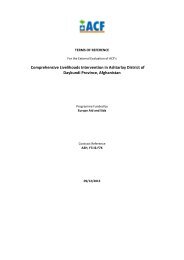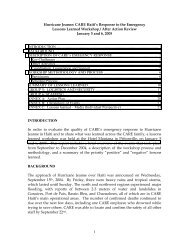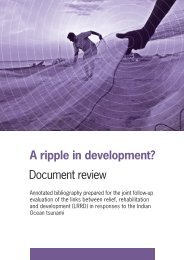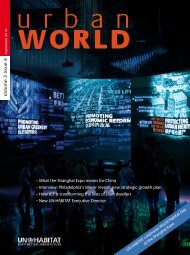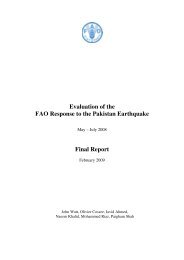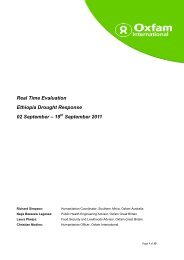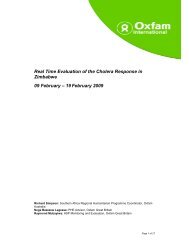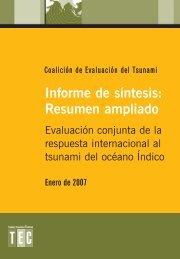Inter-Agency Real Time Evaluation of the Humanitarian ... - alnap
Inter-Agency Real Time Evaluation of the Humanitarian ... - alnap
Inter-Agency Real Time Evaluation of the Humanitarian ... - alnap
You also want an ePaper? Increase the reach of your titles
YUMPU automatically turns print PDFs into web optimized ePapers that Google loves.
IA RTE <strong>of</strong> <strong>the</strong> humanitarian response to Pakistan’s 2010 Floods crisis<br />
include PDMA in <strong>the</strong> coordination activities from <strong>the</strong> Multan hub (5‐6 hours drive from<br />
provincial capital Lahore), but provincial authorities did not respond effectively.<br />
116. Today <strong>the</strong> PDMAsinvolvement in <strong>the</strong> response avtivities have been limited both Sindh<br />
and Punjab. This have partly to due to <strong>the</strong>ir limited experience and capacity to involve<br />
effectively, partly because hubs were created outside <strong>the</strong>ir operation spheres. While this <strong>of</strong><br />
course is unfortunate, most stakeholders consider that <strong>the</strong> advantages <strong>of</strong> responding from <strong>the</strong><br />
hubs outweighted <strong>the</strong> disadvantages <strong>of</strong> disconnect with PDMA structures. Lack <strong>of</strong> coordination<br />
between NDMA and PDMA also meant that <strong>the</strong> provincial authorities were ‘vertically’ detached.<br />
There are ongoing activities in Sindh to ensure that PDMA takes a more prominent position in<br />
<strong>the</strong> recovery activities, a process lead by OCHA and UNDP in close collaboration with <strong>the</strong> Sindh<br />
authorities.<br />
Effectiveness<br />
117. Operational coordination was mainly carried out at district levels, <strong>of</strong>ten chaired by <strong>the</strong><br />
DCO, in some cases with support from an OCHA focal point. OCHA has successfully promoted<br />
this level <strong>of</strong> field coordination, hence brining coordination closer to operations. District<br />
coordination has added value to <strong>the</strong> operations, progressively ensuring primarily that<br />
duplications were avoided, but also that minimum information was shared on needs and gaps.<br />
This decentralised coordination mechanism has also contributed to a more effective response<br />
where <strong>the</strong> leadership <strong>of</strong> <strong>the</strong> DCO did match <strong>the</strong> coordination challenges.<br />
118. Among <strong>the</strong> challenges at district level was <strong>the</strong> lack <strong>of</strong> information sharing, especially from<br />
INGOs, that bypassed <strong>the</strong> DCO, limiting <strong>the</strong> overall district coordination effectiveness. Ano<strong>the</strong>r<br />
challenge is that clusters as such has no authority, and as line departments rarely participated in<br />
district coordination meetings, it was difficult to take concrete decisions at this level that would<br />
involve sector authorisation.<br />
119. The UN system has invested significant time and resources in ensuring effective<br />
coordination across <strong>the</strong> different levels <strong>of</strong> <strong>the</strong> flood response, but generally speaking, it has not<br />
met <strong>the</strong> mandated coordination challenges. For its part, <strong>the</strong> UN has been criticised for a lack <strong>of</strong><br />
a clear leadership structure during <strong>the</strong> floods, especially in its relations with <strong>the</strong> GoP. It was<br />
generally considered that <strong>the</strong> HC and <strong>the</strong> clusters lacked leadership from <strong>the</strong> agencies. One DCO<br />
said it was like having “11 captains <strong>of</strong> <strong>the</strong> same team on a football pitch”. Also <strong>the</strong> <strong>Humanitarian</strong><br />
Coordinator (HC) leadership has been questioned several times, some with particular reference<br />
to <strong>the</strong> fact that <strong>the</strong> UN Country Team was lead by a UNICEF Representative, whom by some, had<br />
insufficient humanitarian exposure to such large scale disasters, and favoured his own agencies<br />
interest. Added to this comes that during <strong>the</strong> floods, <strong>the</strong> UN Resident Co‐ordinator (RC) position<br />
was between permanent appointments. More recently (January 2011) a double‐hatted HC/RC<br />
has been appointed to lead <strong>the</strong> UN Country Team, hence merging <strong>the</strong> HC and RC functions.<br />
Riccardo Polastro, Aatika Nagrah, Nicolai Steen and Farwa Zafar<br />
48




